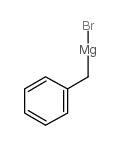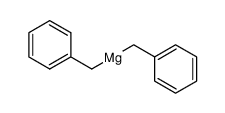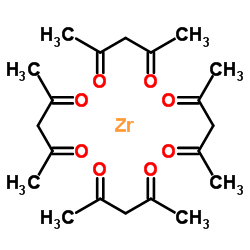24356-01-2
| Name | methanidylbenzene,zirconium(4+) |
|---|---|
| Synonyms |
Tetrabenzylzirconium
MFCD00800569 zirconium tetrabenzyl complex Benzene,methyl-,zirconium complex |
| Melting Point | 116ºC (dec.)(lit.) |
|---|---|
| Molecular Formula | C28H28Zr |
| Molecular Weight | 455.74600 |
| Exact Mass | 454.12400 |
| LogP | 8.00920 |
| Appearance | solid | yellow to orange |
| Storage condition | below 5° C |
Synonym:None Section 2 - COMPOSITION, INFORMATION ON INGREDIENTS
Risk Phrases: 17 Section 3 - HAZARDS IDENTIFICATION EMERGENCY OVERVIEW
Spontaneously flammable in air.Moisture sensitive.The toxicological properties of this material have not been fully investigated.Air sensitive. Potential Health Effects Eye: May cause eye irritation. The toxicological properties of this material have not been fully investigated. Skin: May cause skin irritation. The toxicological properties of this material have not been fully investigated. Ingestion: May cause irritation of the digestive tract. The toxicological properties of this substance have not been fully investigated. Inhalation: May cause respiratory tract irritation. The toxicological properties of this substance have not been fully investigated. Chronic: No information found. Section 4 - FIRST AID MEASURES Eyes: Flush eyes with plenty of water for at least 15 minutes, occasionally lifting the upper and lower eyelids. Get medical aid. Skin: Get medical aid. Flush skin with plenty of water for at least 15 minutes while removing contaminated clothing and shoes. Wash clothing before reuse. Ingestion: Never give anything by mouth to an unconscious person. Get medical aid. Do NOT induce vomiting. If conscious and alert, rinse mouth and drink 2-4 cupfuls of milk or water. Inhalation: Remove from exposure and move to fresh air immediately. If not breathing, give artificial respiration. If breathing is difficult, give oxygen. Get medical aid. Notes to Physician: Antidote: None reported. Section 5 - FIRE FIGHTING MEASURES General Information: Evacuate area and fight fire from a safe distance. As in any fire, wear a self-contained breathing apparatus in pressure-demand, MSHA/NIOSH (approved or equivalent), and full protective gear. May burn with invisible flame. During a fire, irritating and highly toxic gases may be generated by thermal decomposition or combustion. Spontaneously ignitable in air. Extinguishing Media: Use dry sand or earth to smother fire. Use agent most appropriate to extinguish fire. Do NOT get water inside containers. Contact professional fire-fighters immediately. DO NOT USE WATER, CO2, OR FOAM DIRECTLY ON FIRE ITSELF. Section 6 - ACCIDENTAL RELEASE MEASURES General Information: Use proper personal protective equipment as indicated in Section 8. Spills/Leaks: Clean up spills immediately, observing precautions in the Protective Equipment section. Sweep up or absorb material, then place into a suitable clean, dry, closed container for disposal. Isolate area and deny entry. Provide ventilation. Place under an inert atmosphere. Do not get water inside containers. Do not use combustible materials such as paper towels to clean up spill. Section 7 - HANDLING and STORAGE Handling: Wash thoroughly after handling. Remove contaminated clothing and wash before reuse. Minimize dust generation and accumulation. Use spark-proof tools and explosion proof equipment. Avoid contact with eyes, skin, and clothing. Keep container tightly closed. Avoid ingestion and inhalation. Handle under an inert atmosphere. Store protected from air. Do not allow contact with water. Keep from contact with moist air and steam. Storage: Keep away from heat, sparks, and flame. Store in a tightly closed container. Store in a cool, dry, well-ventilated area away from incompatible substances. Keep containers tightly closed. Do not expose to air. Store protected from moisture. Store under an inert atmosphere. Section 8 - EXPOSURE CONTROLS, PERSONAL PROTECTION Engineering Controls: Use explosion-proof ventilation equipment. Use adequate ventilation to keep airborne concentrations low. Exposure Limits CAS# 24356-01-2: Personal Protective Equipment Eyes: Wear appropriate protective eyeglasses or chemical safety goggles as described by OSHA's eye and face protection regulations in 29 CFR 1910.133 or European Standard EN166. Skin: Wear appropriate protective gloves to prevent skin exposure. Clothing: Wear appropriate protective clothing to prevent skin exposure. Respirators: Follow the OSHA respirator regulations found in 29 CFR 1910.134 or European Standard EN 149. Use a NIOSH/MSHA or European Standard EN 149 approved respirator if exposure limits are exceeded or if irritation or other symptoms are experienced. Section 9 - PHYSICAL AND CHEMICAL PROPERTIES Physical State: Solid Color: Not available. Odor: Not available. pH: Not available. Vapor Pressure: Not available. Viscosity: Not available. Boiling Point: Not available. Freezing/Melting Point: Not available. Autoignition Temperature: Not available. Flash Point: Not available. Explosion Limits, lower: Not available. Explosion Limits, upper: Not available. Decomposition Temperature: Solubility in water: soluble in toluene Specific Gravity/Density: Molecular Formula: C28H28Zr Molecular Weight: 455.75 Section 10 - STABILITY AND REACTIVITY Chemical Stability: Powder or liquid is pyrophoric. Conditions to Avoid: Incompatible materials, ignition sources, dust generation, moisture, exposure to air, strong oxidants. Incompatibilities with Other Materials: Strong oxidizing agents, moisture, air. Hazardous Decomposition Products: Irritating and toxic fumes and gases. Hazardous Polymerization: Has not been reported Section 11 - TOXICOLOGICAL INFORMATION RTECS#: CAS# 24356-01-2 unlisted. LD50/LC50: Not available. Carcinogenicity: Tetrabenzylzirconium - Not listed by ACGIH, IARC, or NTP. Section 12 - ECOLOGICAL INFORMATION Other No information available. Section 13 - DISPOSAL CONSIDERATIONS Dispose of in a manner consistent with federal, state, and local regulations. Section 14 - TRANSPORT INFORMATION IATA Not regulated as a hazardous material. IMO Not regulated as a hazardous material. RID/ADR Not regulated as a hazardous material. Section 15 - REGULATORY INFORMATION European/International Regulations European Labeling in Accordance with EC Directives Hazard Symbols: Not available. Risk Phrases: R 17 Spontaneously flammable in air. Safety Phrases: S 24/25 Avoid contact with skin and eyes. S 28A After contact with skin, wash immediately with plenty of water. S 37 Wear suitable gloves. S 45 In case of accident or if you feel unwell, seek medical advice immediately (show the label where possible). WGK (Water Danger/Protection) CAS# 24356-01-2: No information available. Canada None of the chemicals in this product are listed on the DSL/NDSL list. CAS# 24356-01-2 is not listed on Canada's Ingredient Disclosure List. US FEDERAL TSCA CAS# 24356-01-2 is not listed on the TSCA inventory. It is for research and development use only. SECTION 16 - ADDITIONAL INFORMATION N/A |
| Hazard Codes | F: Flammable; |
|---|---|
| Risk Phrases | 15-11-17 |
| Safety Phrases | 8-43-16-6 |
| RIDADR | UN 1325 |
| HS Code | 2902909090 |
|
~66% 
24356-01-2 |
| Literature: Univation Technologies, LLC Patent: US7067686 B1, 2006 ; Location in patent: Page/Page column 9; 11 ; |
|
~68% 
24356-01-2 |
| Literature: Univation Technologies, LLC Patent: US7067686 B1, 2006 ; Location in patent: Page/Page column 9; 11 ; |
|
~64% 
24356-01-2 |
| Literature: Covert, Katharine J.; Mayol, Ana-Rita; Wolczanski, Peter T. Inorganica Chimica Acta, 1997 , vol. 263, # 1-2 p. 263 - 278 |
| Precursor 4 | |
|---|---|
| DownStream 1 | |
| HS Code | 2902909090 |
|---|---|
| Summary | 2902909090 other aromatic hydrocarbons。Supervision conditions:None。VAT:17.0%。Tax rebate rate:9.0%。MFN tariff:2.0%。General tariff:30.0% |




